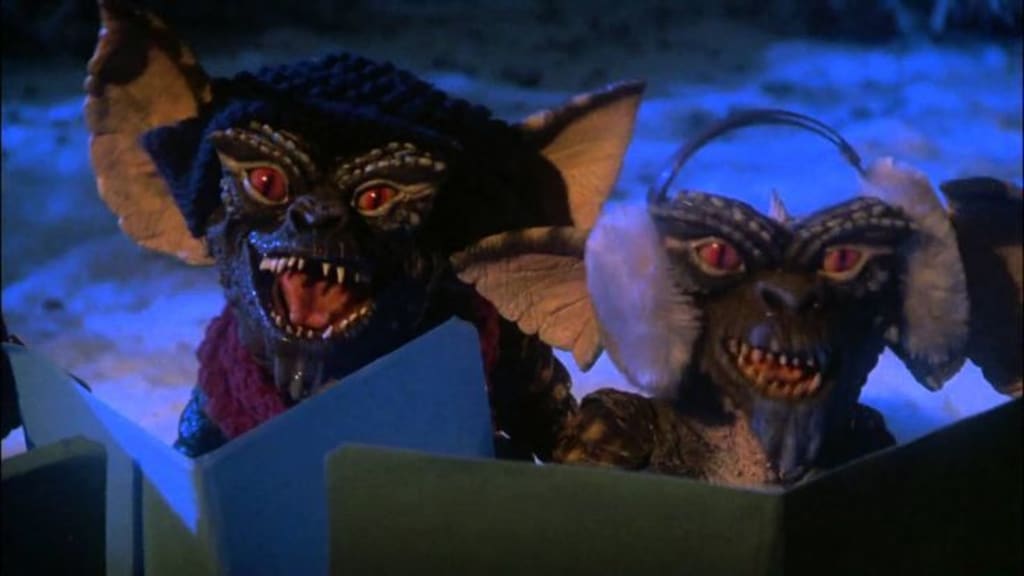If ‘Gremlins’ Isn’t a Christmas Movie, Then Just What Is?
Gifts of the Mogwai

When I tell people that Gremlins, the 80’s classic from director Joe Dante, writer Chris Columbus, and producer Steven Spielberg, is my favorite Christmas movie, plenty of people inevitably scoff. I get told that it’s not a “real” Christmas movie, even though it seems to tick every box that a Christmas movie should. So why do so many think it doesn’t count? If Gremlins isn’t a Christmas movie, what is? Surely a movie doesn’t have to take place at the North Pole and star Santa himself in order to be considered a proper Christmas movie, does it? Some of the most beloved Christmas movies of all time acknowledge the nonexistence of Santa Claus, but that hardly disqualifies them in the public eye. So what is it about Gremlins specifically that makes people dismiss it? While people will probably be debating Die Hard’s eligibility as a true Christmas movie until the end of time, allow me to present my case for Gremlins, my very favorite Christmas movie.
For those who aren’t familiar with Gremlins, this is the basic premise. Struggling inventor Randall Peltzer (Hoyt Axton) buys an exotic new pet called a Mogwai from a strange shop in Chinatown to give to his son Billy (Zach Galligan) for Christmas. Randall names the little creature Gizmo, and he and Billy are instantly inseparable. But there are very specific do’s and don’ts for raising a Mogwai: avoid bright lights, don’t get them wet, and don’t feed them after midnight. When Billy’s (and others’) carelessness with these rules results in the Mogwai not only multiplying, but turning into mischievous little killing machines, it’s up to Billy and his crush Kate (Phoebe Cates) to stop them before they destroy the entire town.
So while the surface-level plot description might suggest that the Christmas setting is merely a backdrop for an unrelated story, Christmas is in every strand of the film’s DNA. The town of Kingston Falls was played almost entirely by the Universal Studios backlot in an attempt to evoke It’s a Wonderful Life, even mimicking certain shots from the end of that movie as Billy runs through the town. Subliminal as these similarities may be, they do instantly create a sense of homespun warmth before the carnage ensues. The music, the decorations, the color palette, the snow; it all just feels like Christmas right off the bat, and it’s a sincere depiction, not snarky ploy to lead the audience on or a cheap attempt at getting asses in seats.
As with most films geared towards families, especially those set around holidays, there are references to things like love and family, but the film also readily acknowledges that the season can be very difficult for a lot of people, something not nearly enough Christmas movies do, in my opinion. Kate has a notorious monologue about how she found out there’s no Santa Claus, detailing a traumatic, yet darkly funny, childhood story about a prior Christmas. The studio actually wanted the scene cut, but Dante refused, insisting that it actually encapsulates the film’s blend of comedy and horror perfectly. Not only could I not agree more, I feel like it’s also an important reminder that, as joyous as Christmas is supposed to be, some don’t see it that way. Plenty of people have trauma and/or painful memories associated with it. Hell, to some folks, it’s just incredibly stressful, and the cloying sentimentality of the season can feel like mockery to those people. This dynamic is important to address, and honestly makes the depiction of Christmas feel more complete.
Another thing that, to me, ties the movie to Christmas even more is the commentary. Naming the main Mogwai Gizmo is a strategic choice that gives the film an extra satirical layer. When Billy’s friend Pete (played by Corey Feldman) first sees the Mogwai, he immediately wants one. Suddenly, everyone wants his new “gizmo”, but because they’re irresponsible with them, they multiply and cause mass chaos and destruction. It’s not exactly a subtle parody of commercialism, but subtlety has never been a priority of Christmas movies (or Christmas in general). And while the last two points aren’t necessarily positive things about Christmas, they are undeniably about Christmas.
So with all of that said, what else is it about Gremlins that people say disqualifies it from being a Christmas movie? Some people point to the fact that it’s a monster movie. Well, that argument is pretty easy to dismantle. For starters, the Rankin-Bass TV specials “Santa Claus is Comin’ to Town” and “Rudolph the Red-Nosed Reindeer” both feature monsters (the Winter Warlock and the Abominable Snowman, respectively). Both of these characters turn good by the end of the story, but when first introduced, they are meant to be genuinely intimidating, at least to children. And need I even mention the Grinch? But if we go back even further than that, Charles Dickens’ A Christmas Carol is the most celebrated Christmas story of all time (other than the birth of Jesus, I suppose). The story revolves around a miser being haunted by ghosts in order to scare him into celebrating Christmas, and that’s not even addressing the monster that is unfettered capitalism. Countless film and television adaptations later, and it’s still one of the all-time greats, so why does it count, but Gremlins doesn’t? Gremlins doesn’t even have a starving child with a degenerative bone disease. In fact, have you ever wondered why the song “It’s the Most Wonderful Time of the Year” mentions “scary ghost stories” as a Christmas tradition? That’s because it actually used to be one! In Victorian England, people would tell ghost stories in December because the nights were longer and colder, lending a spookiness to the atmosphere. This tradition never carried over to the United States (except for the Dickens story, of course), but it is actually an older tradition than Christmas lights.
What else is un-Christmasy about Gremlins? The violence? That’s another quick fix. Another beloved Christmas classic from the 80’s is Home Alone. I think it can be argued quite well that Home Alone is far less qualified than Gremlins to be a “real” Christmas movie. The centerpiece of Home Alone is the violence. It’s goofy, PG-rated slapstick (despite quite a bit of it being lethal if attempted in real life), but the film is built around the burglars being brutalized by Kevin. Sure, it takes place at Christmas, and there are messages about family, but it largely revolves around the comedic violence. That’s the primary reason for watching the movie. While there is a fair amount of violence inflicted upon humans in Gremlins, most of which is equally cartoonish, the comedic focus is more about the titular gremlins’ interactions with each other and the world around them, as well as the impressive special effects on display. People getting hurt makes up the majority of the humor in Home Alone and its various sequels, and it arguably has less to do with Christmas than Gremlins does. Am I saying that Home Alone shouldn’t count as a Christmas movie? Not at all, but if Gremlins isn’t a Christmas movie, Home Alone doesn’t even come close.
Some people point to the film’s darker moments as disqualifiers, and I do have plenty to say about that, too. For one, if we’re gonna keep using examples of “real” Christmas movies to compare and contrast, take It’s a Wonderful Life. It’s one of the most seminal films of the Christmas season, even though it’s essentially about contemplating suicide. It’s also another one that has far less to do with Christmas than I think many remember, but even setting that aside, it’s a pretty bleak premise. An Angel is having to convince a man not to kill himself, and that the world is a better place because he exists. Up until the finale, the movie is surprisingly dreary, but try telling any boomer that it shouldn’t be considered a Christmas movie. I don’t know where this idea that a Christmas movie can’t have moments of darkness came from, but it just doesn’t track. If you’re like me and grew up celebrating Christmas as a religious holiday as well, it seems to me that nothing would make more sense than to depict a dark world where, despite tragedy and hardship, good triumphs over evil. That was the whole point of Jesus, wasn’t it? Bringing hope and joy to a sick world? Not to compare Gremlins to what is literally often referred to as “the greatest story ever told” or anything, but I feel like the point stands. Why try to completely exclude darkness from a story that culminates in good defeating evil? The more we downplay the evil, the less satisfying it is for good to triumph (to an extent, of course). I’m not saying every Christmas movie has to include those kinds of stakes, but it’s pretty absurd to claim that a Christmas story shouldn’t under any circumstances. And I feel like just because a piece of media is intended for a broader age range, that doesn’t mean it’s obligated to talk to its audience as if all of them are 5-year olds who need to be shielded from the fact that bad things can happen to good people sometimes.
So how can it truly be said that Gremlins isn’t a “real” Christmas movie? If this movie doesn’t count for any number of the reasons above, then very few movies actually would. Is it just a lack of media literacy? Implicit bias against the horror genre? Who knows? All I’m saying is give it a watch and see for yourself. I, for one, look forward to watching it every year around December. So whatever you believe or celebrate, happy holidays, folks. And remember: if your air conditioner goes on the fritz, or your washing machine blows up, or your video recorder conks out; before you call the repairman, turn on all the lights, check all the closets and cupboards, look under all the beds, 'cause you never can tell… there just might be a gremlin in your house.
About the Creator
Will Lasley
I’m an actor and director of stage and screen. But I also dabble in standup, and on this site, horror movie criticism. I’m just a guy who loves horror movies, and I like to share that love with the world.






Comments
There are no comments for this story
Be the first to respond and start the conversation.